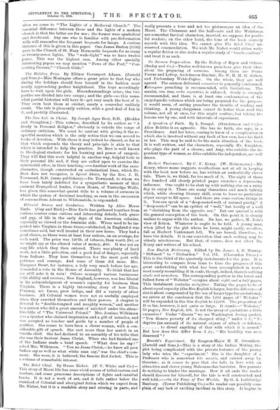Colonial Dames and Goodwives. Written by Alice Morse Earle. (Gay
and Bird.)—Miss Earle has gathered together from various sources some curious and interesting details, both grave and gay, of life in the early days of the American colonies, especially as viewed on the feminine side. Wives used to be im- ported into Virginia in those times,—abducted, in England it was sometimes said, but well treated in their new home. They had a good choice, as there were at least four suitors, on an average, for each maid. The price was 120 lb. of tobacco, then worth $80, or we might say at the altered value of money, £80. It was not an easy life which they then entered. There was plenty of hard work, not a little privation, and a good deal of danger, especially from Indians. They bore themselves for the most part with patience and courage. And some of them did more. Mrs. Margaret Brent, for instance, a lady very much before her age, demanded a vote in the House of Assembly. To think that her sex still asks it in vain! Others managed various businesses with ability and success; New England, however, was less liberal in its acknowledgment of women's capacity for business than Virginia. There is a highly interesting story of how Eliza Pinkney, née Lucas, grew indigo, and did a variety of other business. All Colonial women were not so usefully employed when they asserted themselves and their powers. A chapter is devoted to "double-tongued and naughty women," and another to a person who did a great amount of mischief under the attrac- tive title of " The Universal Friend." Mrs. Jemima Wilkinson was a Quaker who claimed inspiration and a gift of miracles, and was accepted as teacher and guide by a number of people of position. She seems to have been a clever woman, with a con- siderable gift of speech. She met more than her match in an Oneida chief. She had declared to an assembly of his tribe that she was their Saviour Jesus Christ. When she had finished one
of the Indians made a brief speech. What does he say ?" asked Mrs. Wilkinson. "You no Jesus Christ,—he know all poor Indian say as well as what white man say," was the chief's com- ment. She wore, it is believed, the famous Red Jacket. This is a volume of remarkable interest.


















































 Previous page
Previous page